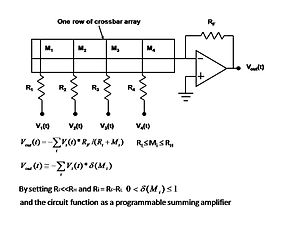 Image via Wikipedia
Image via Wikipedia
Researchers at HP Labs have solved a decades-old mystery by proving the existence of a fourth basic element in integrated circuits that could make it possible to develop computers that turn on and off like an electric light. The memristor — short for memory resistor - could make it possible to develop far more energy-efficient computing systems with memories that retain information even after the power is off, so there's no wait for the system to boot up after turning the computer on. It may even be possible to create systems with some of the pattern-matching abilities of the human brain.
The memristor first appeared in a 1971 paper published by Professor Leon Chua, a distinguished faculty member in the Electrical Engineering and Computer Sciences Department of the University of California Berkeley.Chua described and named the memristor, arguing that it should be included along with the resistor, capacitor and inductor as the fourth fundamental circuit element. The memristor has properties that cannot be duplicated by any combination of the other three elements.
"To find something new and yet so fundamental in the very mature field of electrical engineering is a big surprise," said R. Stanley Williams, an HP Senior Fellow and director of the Information and Quantum Systems Lab (IQSL).
Brain-like systems?
As for the human brain-like characteristics, memristor technology could one day lead to computer systems that can remember and associate patterns in a way similar to how people do.
This could be used to substantially improve facial recognition technology or to provide more complex biometric recognition systems that could more effectively restrict access to personal information.
These same pattern-matching capabilities could enable appliances that learn from experience and computers that can make decisions.
http://www.hpl.hp.com/news/2008/apr-jun/memristor.html
http://en.wikipedia.org/wiki/Memristor
![Reblog this post [with Zemanta]](http://img.zemanta.com/reblog_e.png?x-id=8ec04471-4df7-4044-8108-c3a14cd3a8f8)



No comments:
Post a Comment